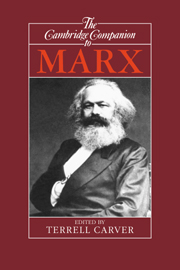5 - History
Critique and irony
Published online by Cambridge University Press: 28 May 2006
Summary
One need not be a Marxist to appreciate the breadth and depth of Marx's learning and the important legacy that he left to philosophy and the social sciences. Marxian concepts and categories are today employed even by non-Marxist anthropologists, economists, political scientists, and sociologists. And yet Marx's legacy has, on the whole, been an ambiguous one. His works - like those of Scripture or literature or the law - are open to different, and sometimes quite divergent, interpretations. Despite their differences, however, readers of Marx are apt to agree on at least one point: His philosophy of history, his account of how historical change comes about, occupies a pivotal place in his overall outlook.
The phrase philosophy of history was coined by Voltaire in the eighteenth century to refer to any grand philosophical system that purports to divine the direction and destination of history. Such allencompassing schemes are to be found, for example, in Giambattista Vico's New Science (1725) and in the Marquis de Condorcet's Sketch for a Historical Picture of the Progress of the Human Mind (1794). Marx was exceedingly critical of the “air castles” constructed by his predecessors, and he was particularly critical of the speculative philosophy of history constructed by G. W. R Hegel. And yet Marx's philosophy of history evolved mainly from his own critical confrontation with Hegel's speculative system. I propose to begin, therefore, with a brief account of Hegel's philosophy of history, followed by a more extended account of Marx's appropriation and critique of Hegel. This done, I shall consider several controversies that have arisen over what Marx meant. And finally, I shall conclude with some speculations about the directions in which Marx's view of history appear to point.
- Type
- Chapter
- Information
- The Cambridge Companion to Marx , pp. 124 - 142Publisher: Cambridge University PressPrint publication year: 1991
- 3
- Cited by



